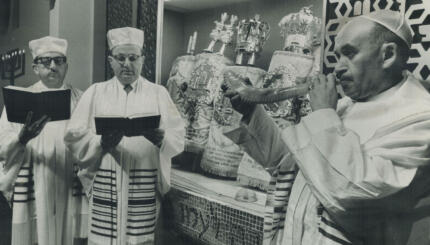Yom Kippur, also known as the Day of Atonement, and the Day of Judgment, is devoted completely to communal repentance for sins committed over the course of the previous year. From sundown to sundown, Jews fast (eating no food and drinking no water), abstain from pleasurable activities, and pray in community — it is the most solemn day on the calendar. These are some rituals that lead into the holiday:
Early Confessional
Jews who pray three times daily include a special “early-bird” confessional prayer (the Viddui, which is recited throughout Yom Kippur) in their prayers.
Pre-Fast Meal
With your help, My Jewish Learning can provide endless opportunities for learning, connection and discovery.
Before sundown, Jews eat their last meal before fasting, called a seudah mafseket, a “meal of stopping.” Tips for planning a pre-fast meal that will carry you through the fast can be found here.
Mikveh
Some Jews immerse in a mikveh, a ritual bath, to purify themselves before entering the holiest of days on the Jewish calendar.
Dressing
On Yom Kippur, it is customary to wear white as a symbol of purity. Many Jews wear a kittel, a ritual garment that is worn also at one’s wedding and at the Passover seder, and which ultimately becomes the person’s burial shroud. The symbolism here is that Yom Kippur, the Day of Judgment, is a rehearsal for one’s death.
Lighting Candles
Before leaving for synagogue, Jews light candles. First, they light a yahrtzeit candle that will burn for 25 hours, throughout Yom Kippur, to remember loved ones they have lost. Then, they light two candles for the holiday. Here is the blessing (click here for Hebrew) over the candles (the words in parentheses are said only when Yom Kippur coincides with Shabbat):
Barukh ata adonai eloheinu melech ha-olam asher kiddishanu b’mitzvotav v’tzivanu l’hadlik ner shel (shabbat v’shel) yom ha-kippurim.
Blessed are You, Lord our God, Ruler of the Universe, who has made us holy with commandments and commanded us to kindle the lights of (Shabbat and) Yom Kippur.
Next, Jews recite Shehechiyanu, thanking God for allowing them to reach this occasion:
Barukh ata adonai eloheinu melech ha-olam shehechiyanu, v’kiyimanu, v’higiyanu la-zman ha-zeh.
Blessed are You, Lord our God, Ruler of the Universe, who has kept us alive, sustained us, and brought us to this occasion.
Kol Nidre
With the home preparations complete, Jews head off to synagogue for Kol Nidre services, bringing their tallit with them (Kol Nidre is the only time the tallit is worn at night). Kol Nidre is recited just a few moments before sundown and this is traditionally the most well-attended service of the year.
Returning Home
Upon returning home from services, in addition from steering clear of the fridge, Jews refrain from entertainment, bathing, or sex during the most holy day of the year.



